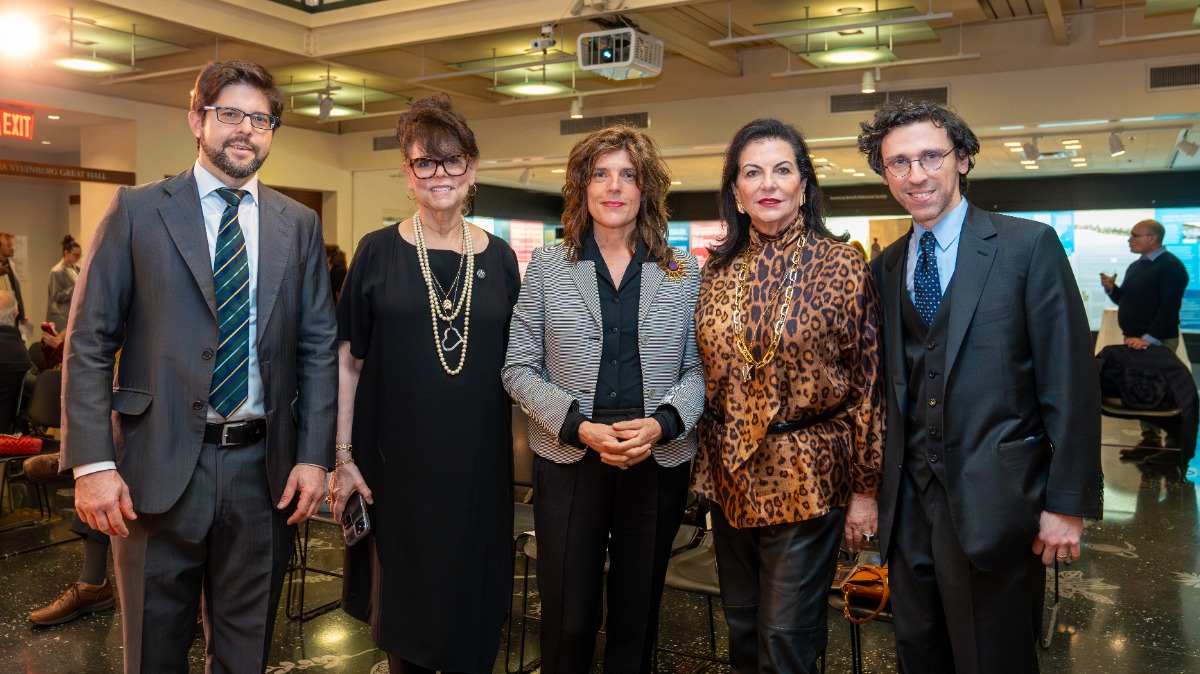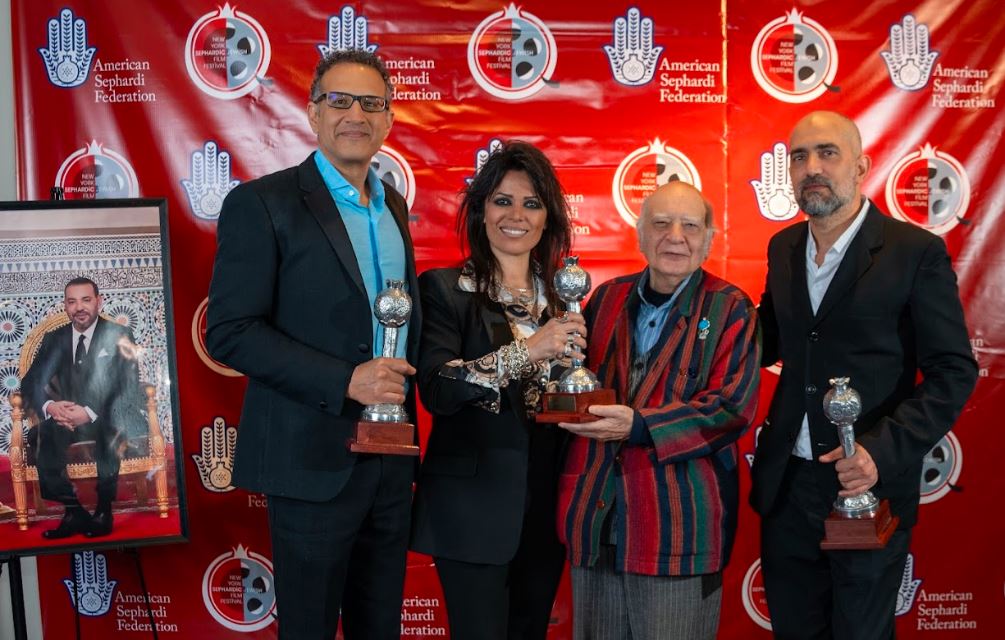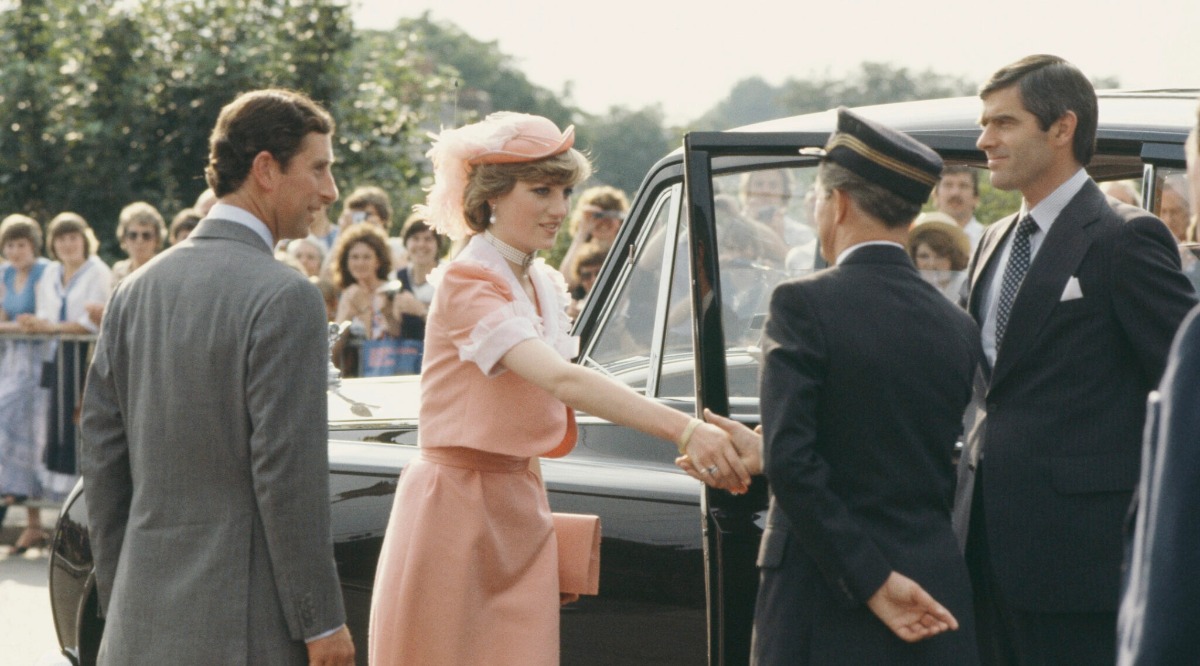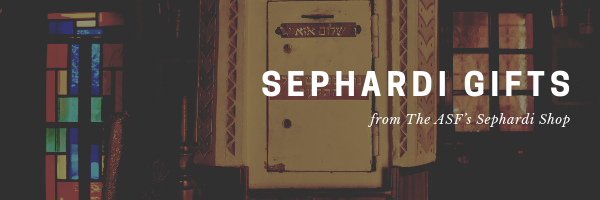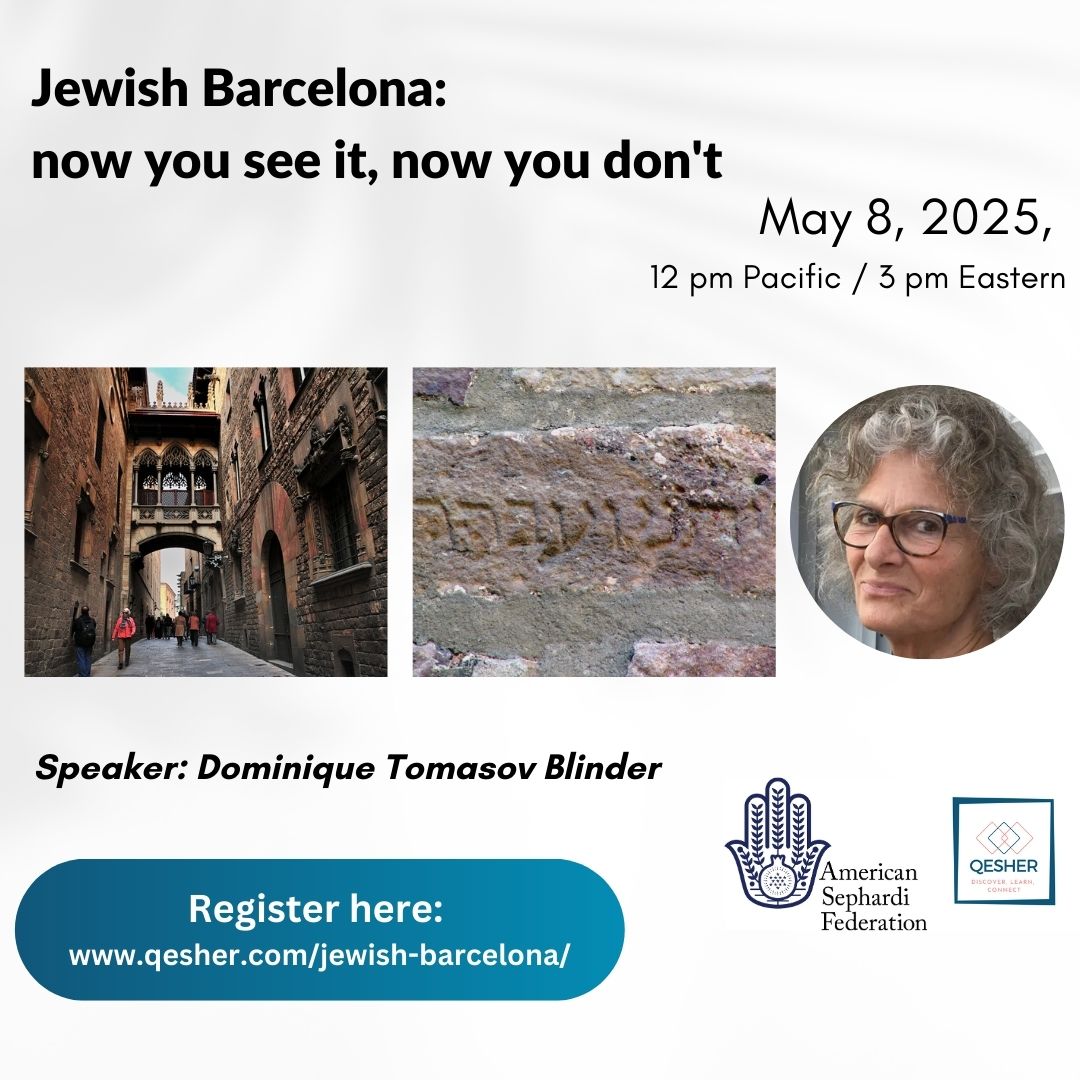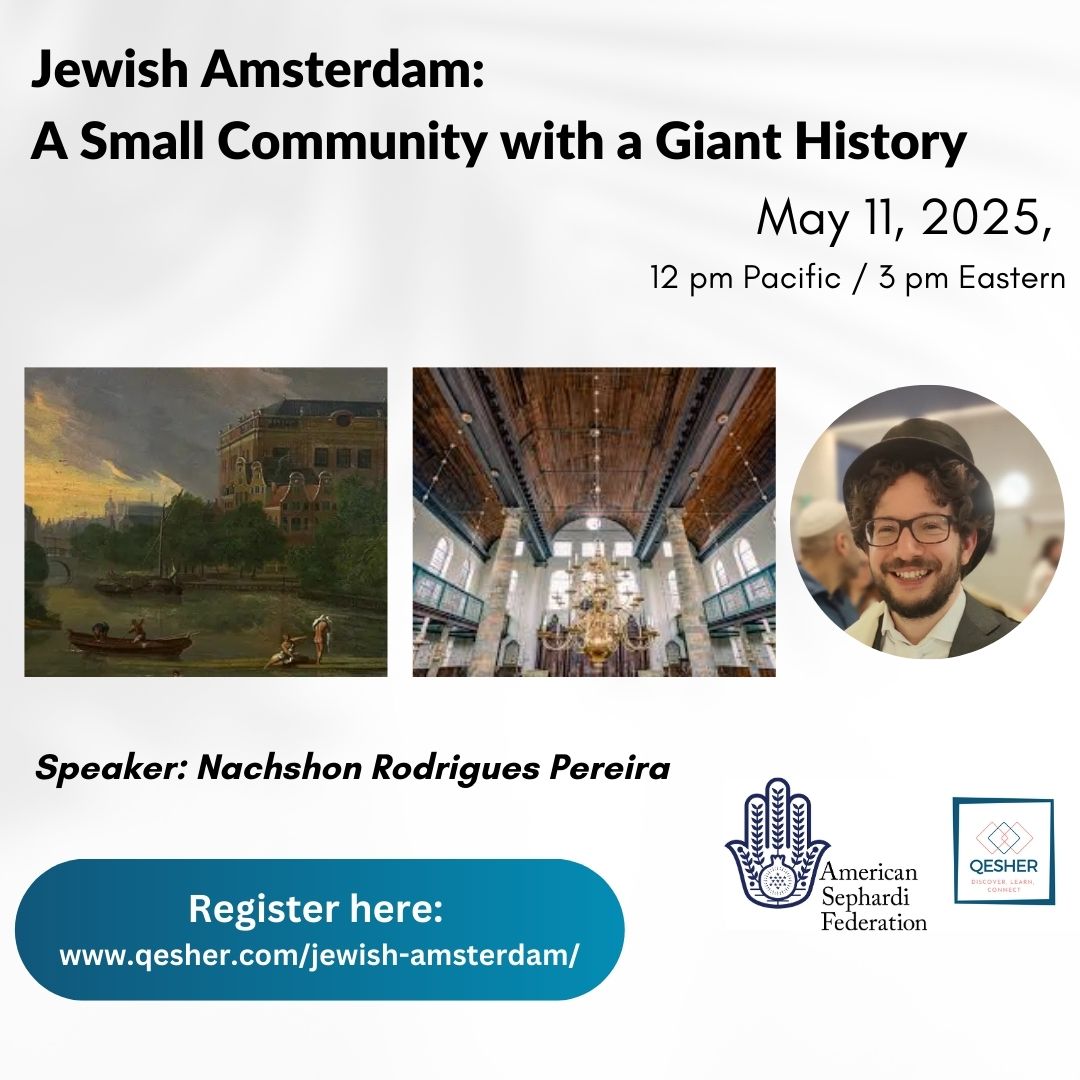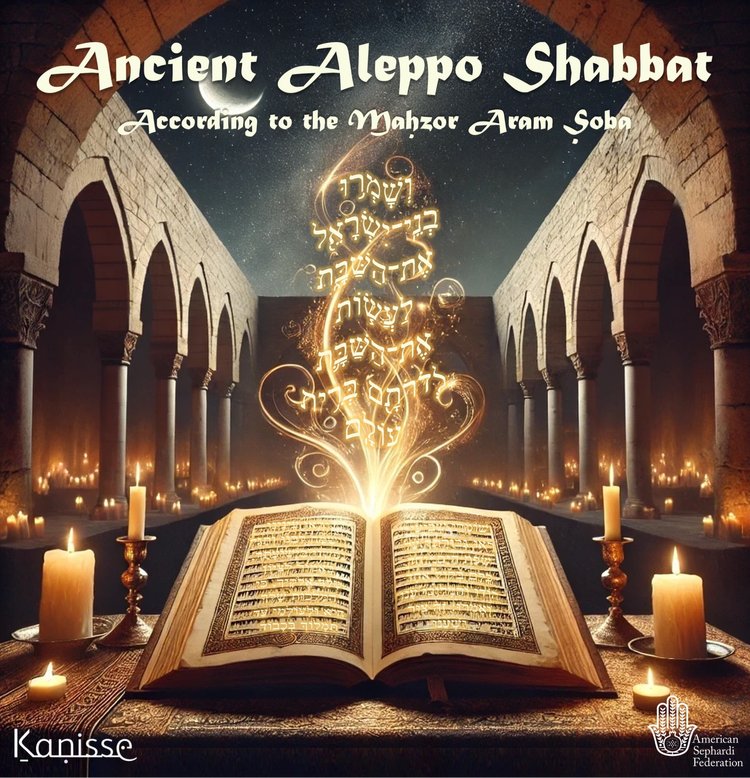In Memory of Jacob Chetrit, A”H, a Moroccan-born developer and “member of one of New York’s most influential and enigmatic real estate families.”
Click here to dedicate a future issue in honor or memory of a loved one
Subscribe ◊ Upcoming Events ◊ ASF Sephardi Shop ◊ Donate ◊ Sephardi Ideas Monthly ◊ ASF IJE ◊ ASF Sephardi House ◊ Archive
The Sephardi World Weekly is made possible by Daniel Yifrach, Rachel Sally, Professor Rifka Cook, Maria Gabriela Borrego Medina, Rachel Amar, Deborah Arellano, & ASF VP Gwen Zuares!
Don’t miss the latest Sephardi Ideas Monthly: “Two Jewish Songs, Ancient and Israeli”
Special Announcement: Ruben Shimonov, the ASF’s National Director of Sephardic House & Education, will be speaking at JPro25!
~~~~~
“Sephardic Splendor Unveiled: Inaugurating ‘The Golden Age of the Jews of Alandalus’ Exhibition”
By Meyer Harroch, New York Jewish Travel Guide
Jaime Moreno Bau (Centro Sefarad-Israel), Betty Ehrenberg (World Jewish Congress), Spanish Ambassador Ángeles Moreno Bau, Chella Safra (World Jewish Congress), and Jason Guberman (American Sephardi Federation), The Golden Age of the Jews of Al-Andalus Exhibit Inauguration, Paul S. And Sylvia Steinberg Great Hall, ASF - Center for Jewish History, 11 April 2024
(Photo courtesy of Zakaria Siraj)
Last April scholars, cultural enthusiasts, and community leaders came together “to honor and explore the vibrant legacy of Sephardic communities.” The ASF and World Jewish Congress worked in concert with the Spanish Embassy to bring an exhibit from Centro Sefarad-Israel in Madrid to New York. The exhibit presented
a captivating journey through the history of the Jewish community of Al-Andalus, showcasing the remarkable achievements of figures such as Maimonides. From the community’s origins to its dispersion and eventual extinction, the exhibition shed light on the resilience and enduring legacy of Sephardic culture.
Speakers at the opening included Spain's Ambassador to the United States, Ángeles Moreno Bau, Jaime Moreno Bau, General Director of the Centro Sefarad-Israel; and David Dangoor, President of the ASF. Scholarly perspectives were offered by ASF Broome & Allen Fellows Dr. Vanessa Paloma Duncan Elbaz and Dr. Hélene Jawhara Piñer, as well as Matt Gatton, while Dvir Avnon-Klein, “an ASF Sephardi House Fellow and talented multi-instrumentalist, added a musical dimension to the evening.”
All things considered:
The inauguration of the ‘Golden Age of the Jews of Al-Andalus’ exhibition was a resounding success, exemplifying the ASF’s commitment to fostering cultural exchange and education. It served as a powerful reminder of the rich tapestry of Sephardic history and its lasting impact on the world.
Feature: NY Sephardic Jewish Film Festival Flashback
ASF Pomegranate Award Honorees Ghiora Aharoni, Yasmin Levy, & Shlomi Elkabetz with the sculpter of The Pomegranates, Oded Halahmy, Opening Night of the 25th NY Sephardic Jewish Film Festival, Paul S. And Sylvia Steinberg Great Hall, ASF - Center for Jewish History, 8 May 2023
(Photo courtesy of Zakaria Siraj)
As we prepare for the 27th NY Sephardic Jewish Film Festival next month, watch this flashback to 2023 when Ghiora Aharoni gave an extraordinary acceptance speech on Opening Night at the ASF Pomegranate Awards Ceremony.
“David Sassoon, the Jewish royal designer who dressed Princess Diana, dies at 92”
By Grace Gilson, JTA
Princess Diana dressed in a Belville Sassoon design
(Photo courtesy of Princess Diana Archive/Getty Images/JTA)
Working in the shadow of the British Empire, the Iraqi-Jewish Sassoons set up social networks and flourishing businesses across south and east Asia during the 19th and 20th centuries. Unsurprisingly, some of the Sassoons found their way to England.
David Sassoon, a long-time co-director of the couture house Belville Sassoon, was born in London in 1932 to Iraqi Jewish parents. Sassoon made a name for himself by designing clothes for the British royal family, “including some of Princess Diana’s most iconic looks, such as the going-away dress she wore after her 1981 wedding to Prince Charles.” As for inspiration, Sassoon said that “Jewish traditions played an enormous part in the clothes I designed.”
Sassoon passed away on April 9th at the age of 92.
~~~~~~~
By Dr. Hélène Jawhara Piñer, a 2018 ASF Broome & Allen Fellow
In this extraordinary, award-winning and best-selling cookbook now in its 4th imprint, chef and scholar Hélène Jawhara-Piñer combines rich culinary history and Jewish heritage to serve up over fifty culturally significant recipes. Steeped in the history of the Sephardic Jews (Jews of Spain) and their diaspora, these recipes are expertly collected from such diverse sources as medieval cookbooks, Inquisition trials, medical treatises, poems, and literature. Original sources ranging from the thirteenth century onwards and written in Arabic, Spanish, Portuguese, Occitan, Italian, and Hebrew, are here presented in English translation, bearing witness to the culinary diversity of the Sephardim, who brought their cuisine with them and kept it alive wherever they went. Jawhara-Piñer provides enlightening commentary for each recipe, revealing underlying societal issues from anti-Semitism to social order. In addition, the author provides several of her own recipes inspired by her research and academic studies.
Each creation and bite of the dishes herein are guaranteed to transport the reader to the most deeply moving and intriguing aspects of Jewish history. Jawhara-Piñer reminds us that eating is a way to commemorate the past.
Maimonides, Spinoza and Us: Toward an Intellectually Vibrant Judaism
By Rabbi Marc D. Angel
A challenging look at two great Jewish philosophers, and what their thinking means to our understanding of God, truth, revelation and reason. Moses Maimonides (1138–1204) is Jewish history’s greatest exponent of a rational, philosophically sound Judaism. He strove to reconcile the teachings of the Bible and rabbinic tradition with the principles of Aristotelian philosophy, arguing that religion and philosophy ultimately must arrive at the same truth. Baruch Spinoza (1632–77) is Jewish history’s most illustrious “heretic.” He believed that truth could be attained through reason alone, and that philosophy and religion were separate domains that could not be reconciled. His critique of the Bible and its teachings caused an intellectual and spiritual upheaval whose effects are still felt today. Rabbi Marc D. Angel discusses major themes in the writings of Maimonides and Spinoza to show us how modern people can deal with religion in an intellectually honest and meaningful way. From Maimonides, we gain insight on how to harmonize traditional religious belief with the dictates of reason. From Spinoza, we gain insight into the intellectual challenges which must be met by modern believers.
~~~~~~~
We are thrilled to announce the much anticipated 27th New York Sephardic Jewish Film Festival with the participation of Michel Boujenah, Fortuna, Roya Hakakian, Enrico Macias, and Yael Naim.
Please mark your calendar for Sunday, June 8th, as we kick off a week-long cinematic journey of untold stories celebrating the diversity, poignancy, and humor of the Greater Sephardic world.
Join us for unforgettable experiences filled with exclusive screenings, insightful discussions, and captivating performances.
Stay tuned for the full calendar and ticket information!
~~~~~~~
Upcoming Events or Opportunities
Our friends at Qesher present:
Qesher Book Club:
“Sacred Places Tell Tales: Jewish Life and Heritage in Modern Cairo”
“Historian Yoram Meital interprets Cairo’s synagogues as exquisite storytellers. The synagogues still stand in Cairo, and they shed new light on the social, cultural, and political processes that Egyptian society and the Jews underwent from 1875 to the present. Studying old and new synagogues in the Egyptian capital, their locations, the items they stored, and the range of religious and nonreligious activities they hosted reveals the social heterogeneity and the diverse ways in which modern Jewish sociocultural identity was constructed within Cairo’s Sephardi, Ashkenazi, and Karaite communities.
Meital contends that studying the congregations and the social services provided in synagogues reveals the local Jewish community’s customs, cultural preferences, socioeconomic gaps, and class divisions.”
You can read more and order the book here.
Tuesday, 6 May 3:00PM EST
Sign-up Now!
Tickets: Free Event; RSVP Required
About the author:
Yoram Meital is a professor of Middle East Studies at Ben-Gurion University. He has conducted extensive research on various topics related to Arab societies during the modern era, focusing on Egypt’s social, cultural, political, and legal history. From 2017 to 2021, he served as the historical consultant to the Jewish community in Cairo, actively participating in documenting and preserving Egyptian-Jewish heritage. His publications include Revolutionary Justice: Special Courts and the Formation of Republican Egypt (2017); Peace in Tatters: Israel, Palestine, and the Middle East (2006); and Sacred Places Tell Tales: Jewish Life and Heritage in Modern Cairo (2024).
~~~~~~~
Bookhouse
American Sephardi Federation’s cooperative initiative with Centro Primo Levi, and Dan Wyman Books presents:
A Renaissance Story: David Reubeni, Diplomat and Spy
Zvi Ben-Dor Benite will speak about the story of David Reubeni. R
Arriving in Rome in 1523, a Yemeni Jew proclaimed himself the “Prince of the Lost Tribes” and leader of their 300,000-strong army. Pope Clement VII met with the enigmatic David Ha-Reuveni, who proposed an alliance against the Muslim Turks in exchange for the Holy Land, financial support, and a navy for the Jewish people. Why did so many Italians believe him, what transpired in Italy, and how did the events conclude?
Wednesday, 7 May at 7:00PM
ASF-Center for Jewish History
15 W 16th Street, NYC
Reservation required: rsvp@primolevicenter.org
Bookhouse, American Sephardi Federation’s corporate initiative with Centro Primo Levi (CPL) and Dan Wyman Books, is a small space for study, discussion, and creativity connected to Jewish book culture: from manuscripts to pulps, from Talmud to Yiddish Socialism, from Printers to Bookshops to Readers.
Dan Wyman Books will be exhibiting a rotating collection of approximately 300 rare and important books related to these topics, all of which will be available for browsing and purchase.
~~~~~~~
Our friends at Qesher present:
Jewish Barcelona:
now you see it, now you don't
Focusing on Barcelona, we will explore the irregular evolution of its Jewish community—the second largest in Spain, with approximately 5,000 members today.
And, very importantly, how do we connect with our past? What are our places of memory today? Taking the ancient Jewish cemetery as an example, we will address the challenge of heritage management—an area where religion and science have yet to find common ground.
Thursday, 8 May 3:00PM EST
Sign-up Now!
Tickets: $18
About the author:
Born in New York and raised in Buenos Aires, Dominique Tomasov Blinder is the grandchild of Jews from Belarus and Ukraine. She obtained her Architecture degree at the University of Buenos Aires, and she is also registered in New York and Barcelona. A founding member of the first egalitarian synagogue in Spain, she is responsible for its Chevra Kadisha. She specializes in Jewish heritage as an independent researcher, educator, and activist.
She co-founded The Center of Studies Zakhor, established to
protect the ancient Jewish cemetery in Barcelona. Thanks to
the Center's actions, the site received official designation as a
historical landmark. Other projects include research to define its extension (with a grant from The Rothschild Foundation) and the publication of the book "Funerary tradition in Judaism".
Since 1992 Dominique has been involved in Jewish heritage, culture and community life. Bringing together a special combination of history, current affairs, opinions, and personal experience, she explains to locals and visitors about Jewish identity, culture and history. She is now mainly involved with actions to turn the ancient Jewish cemetery a true place of memory.
~~~~~~~
The Lower East Side Jewish Conservancy and American Sephardi Federation present:
Virtual Tour of the Historic Lazama Synagogue in the Mellah (Jewish Quarter) of Marrakech
The Lazama Synagogue, located in the mellah of Marrakech, was founded in 1492 by Sephardic Jews fleeing King Ferdinand and Queen Isabella’s Edict of Expulsion. See the beautiful historic synagogue these refugees of the Inquisition built and learn about the Andalusian culture they brought to Morocco.
Join your guide from the Mimouna Association, an NGO founded by Moroccan Muslims to preserve and promote the Judeo-Moroccan heritage, for an exclusive exploration of the synagogue and one of the largest Jewish communities in the Kingdom today.
Sunday, 11 May at 12:00PM EST
Sign-up Now!
Tickets: $10
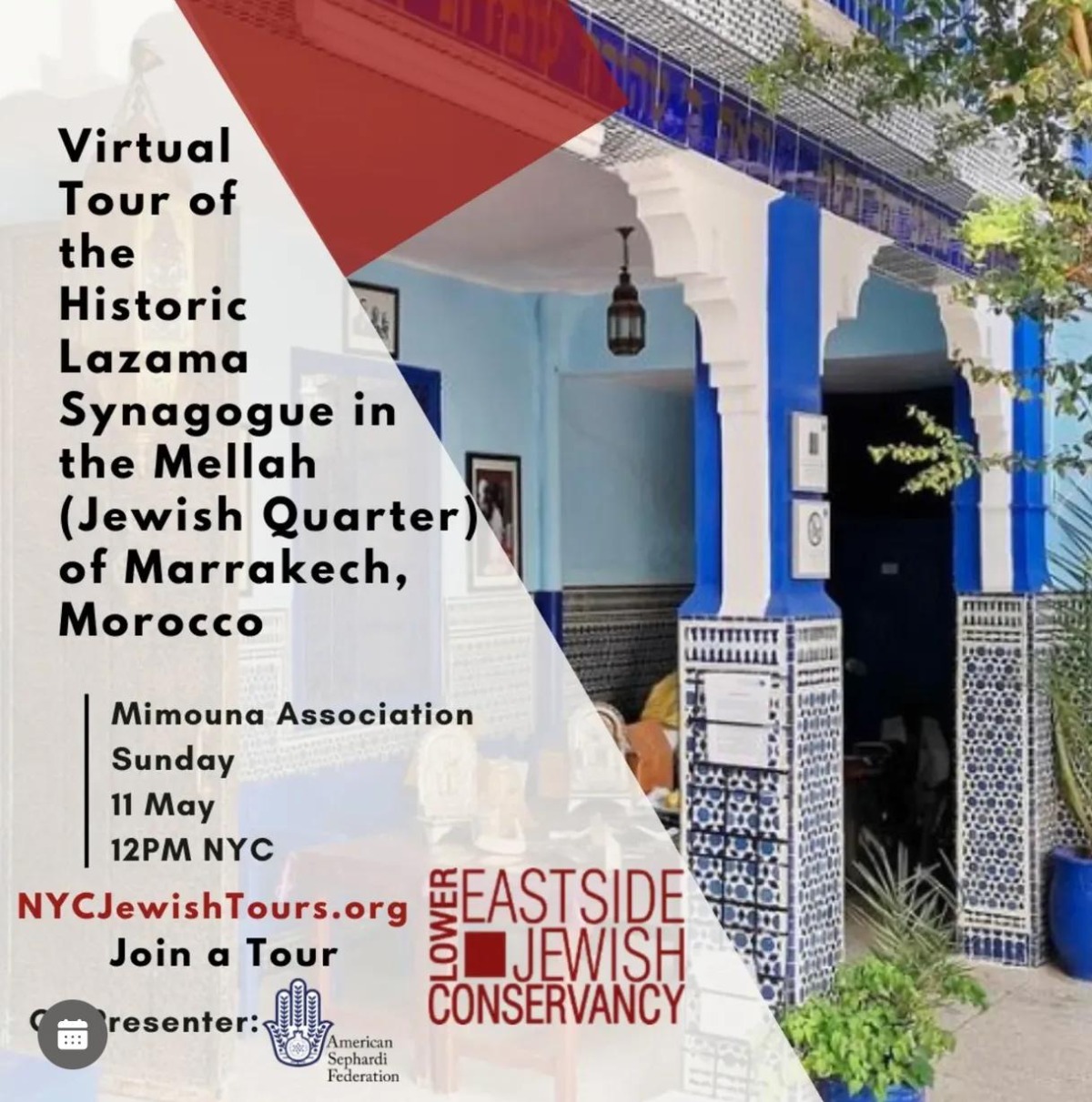
~~~~~~~
Kehila Kedosha Janina Synagogue and Museum presents:
Greek Jewish Festival
Join the Greek Jewish Festival as we celebrate the unique Romaniote and Sephardic heritage of the Jews of Greece. Experience a feast for the senses including authentic kosher Greek foods and homemade Greek pastries, traditional dance performances with live Greek and Sephardic music, an outdoor marketplace full of vendors, arts and educational activities for kids, and much more!
Sunday, 11 May 12:00-6:00PM EST
(280 Broome Street, Lower East Side, NYC)
The ASF is once again proud to be a Festival Sponsor.
Learn more at www.GreekJewishFestival.com
~~~~~~~
Our friends at Qesher present:
Jewish Amsterdam: A Small Community with a Giant History
Nachshon Rodrigues Pereira, one of the few remaining descendants of the original Portuguese Jews of Amsterdam, will describe what Jewish Amsterdam looks like today and what it was like in the 17th century when this city was the center of the Jewish world: offering the best Jewish education, housing the biggest Rabbis and being home to the largest synagogue in the world.
At that time, Amsterdam was one of the few cities in Europe that offered substantial but limited freedom of expression, which allowed for a large part of Jewish history to take place here. It was the Jewish community of Amsterdam that excommunicated Spinoza and was enchanted by the false messiah Shabtai Tsvi.
Sunday, 11 May 3:00PM EST
Sign-up Now!
Tickets: $18
About the author:
Nachshon Rodrigues Pereira is the community leader and Chazzan (Cantor)of the Bendigamos community in Amsterdam. His family has been part of the Portuguese Jewish community of the Netherlands for four centuries. After studying political science and a short political career, he decided he wanted to spend most of his time teaching and rebuilding the Jewish community in Amsterdam. The community is still suffering greatly from the WWII atrocities. Today, he works for the Jewish Seminary of Amsterdam, teaches many bar-mitzvah students, writes for a Jewish news website, and organizes Jewish concerts.
~~~~~~~
Our friends at Kanisse in partnership with American Sephardi Federation present:
Ancient Aleppo Shabbat
Join us as we revive these ancient prayers for Shabbat — for the first time in centuries in their original form as preserved in the Maḥzor Aram Ṣoba — and glimpse into the liturgical world of our Levantine ancestors. This immersive service will include historical insights into the elements that distinguish the ancient Aleppo rite from its modern counterpart, now featured in our newly published Zemirot HaMizraḥ Siddur for Shabbat Evening.
Don’t miss this rare opportunity to experience a lost tradition come to life and reconnect with our ancient liturgical heritage!
Friday, 30 May, 6:00pm - 10:00pm
@The Jewish Theological Seminary
3080 Broadway (at W 122nd Street), New York, NY 10027
Sign-up Now!
Tickets: $36
Tickets include an option to add a discounted copy of the newly published Zemirot HaMizraḥ Siddur for Shabbat Evening
(due to retail at $29.95 but available at the event for $25).
Space is limited and registration is on a first-come, first-served basis.
Ticket sales help cover a portion of our costs for this event. If you are unable to purchase a ticket but would like to attend, please email us at hello@kanisse.org.
~~~~~~~
The Museum of the Bible, the American Sephardi Federation and Jewish Theological Seminary (JTS) present:
Sacred Words: Revealing the Earliest Hebrew Book
Explore the new Library exhibit, featuring the remarkable story of the earliest Hebrew book.
On View through 17 July 2025
@Jewish Theological Seminary
3080 Broadway (at 122nd Street)
New York City
The exhibit is open to the public during Library Hours.
Group tours are available.
Please contact Dr. David Kraemer, Joseph J. and Dora Abbell Librarian and Professor of Talmud and Rabbinics, for more information.
About the Exhibit:
After 1,300 years of untold travels along the Silk Roads, the oldest Hebrew book reveals its extraordinary story. In Sacred Words, guests will behold the oldest-known Hebrew book, containing Sabbath-morning prayers, liturgical poems, and the world’s oldest Haggadah, which was mysteriously written upside down. Learn about the book’s content, its origins on the Silk Roads, and the multicultural cooperation that brought it first to Museum of the Bible in Washington, DC. This sacred book has a story to tell. Come discover it.
This exhibition was created in partnership with the American Sephardi Federation and the Museum of the Bible.

